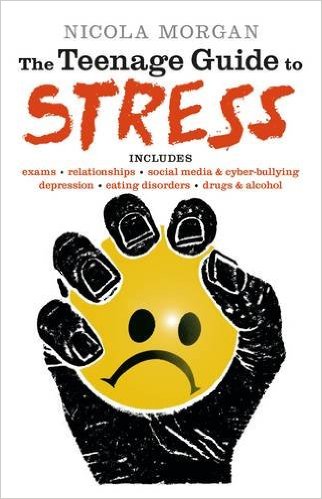“THE TEENAGE GUIDE TO STRESS” by Nicola Morgan
 Teenagers are supposed to have a comfortable life. They don’t have jobs, they don’t pay rent or taxes, and yet, they have their worries such as the pressure to be part of a group, fear of their future, or having to prepare for important exams. Sometimes, we as parents, forget that we were once adolescents as well.
Teenagers are supposed to have a comfortable life. They don’t have jobs, they don’t pay rent or taxes, and yet, they have their worries such as the pressure to be part of a group, fear of their future, or having to prepare for important exams. Sometimes, we as parents, forget that we were once adolescents as well.
The author, Nicola Morgan, is very compassionate towards adolescents, and through her book, she helped me understand some of the problems that cause stress among teenagers.
Her book is straightforward to understand because it is structured in such a way that every chapter describes a particular problem that an adolescent may encounter in his or her life and even suggested strategies to take into consideration in their approach.
So, if you don’t have time to read the entire book, you can freely choose the chapter that you are interested in such as Feelings, Sexual attraction, Drugs, or Bullying. You can always come back later to fill in the gap of an unread chapter.
Feeling angry
“Pretty much everyone feels angry sometimes. It doesn’t mean you’re a bad person. Some feelings of anger come from not being in control.
But feeling angry very often or all the time is not a good thing; it will distract you from focusing properly and may harm relationships with friends and family.”
Feelings of Failure
“Schools push you to do your best at everything, and when your best isn’t good enough, it feels like failure.”
Alcohol and Drugs
“When teenagers use alcohol, they do it for many reasons: because taking risks can be fun, because of peer pressure or the desire for rebellion, and because it can make you feel more confident and relaxed.”
“The truth is that both alcohol and drugs are extremely dangerous for a load of reasons.
And you may not know that they affect teenagers more than adults, for reasons that we don’t exactly understand, except that the teenage brain just seems to be extra vulnerable.”
Bullying
“Bullying can take many forms. It can be name-calling, making up lies about you, minor physical things such as pinching or pushing, stealing or damaging your possessions, saying nasty things about you behind your back or on the internet, threatening you, sending offensive texts or making offensive or silent phone calls.”
Kindle, 2014

Recent Comments